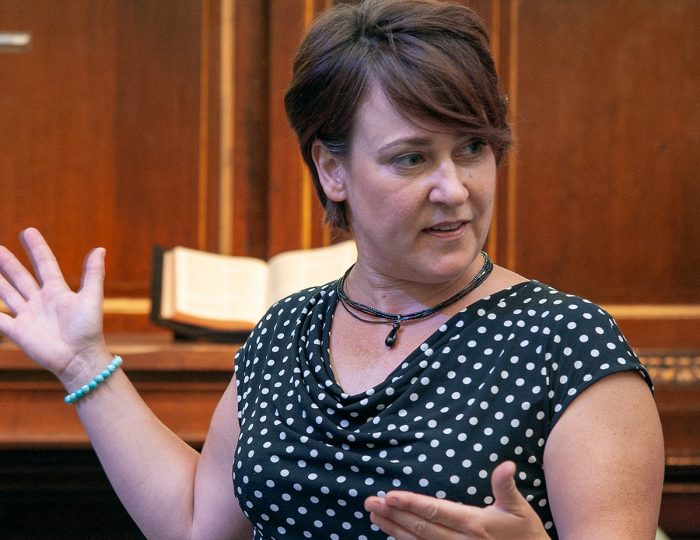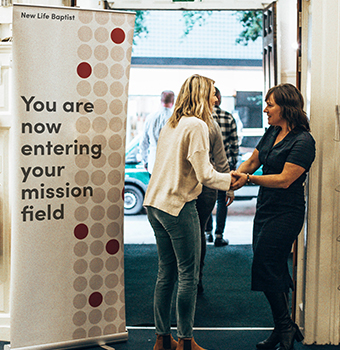Frontline Sundays
Frontline Sundays...
Read

Most churches have a rhythm of meeting weekly on a Sunday. But, whatever day, however often, and whatever style, the times where Christians gather for communal worship are significant in forming character, lifestyle, relationships between people, and relationships with God.
Lindsay Caplen, LICC Church Team member and West of England Baptist Association (WEBA) Regional Minister, shares how church services can play their part in this process.
If every aspect of a Christian’s life is significant to God, what is the purpose of them meeting together on a Sunday? And in light of life’s significance beyond the gathering, how might we reorient the hour or two we spend together in services?
Lindsay Caplen has been wrestling with these questions for a number of years; as a pastor, an active church member, a Regional Minister, and, more recently, as a member of the LICC Church Team.
In addressing the first of those questions, Lindsay describes every church service as ‘a huge opportunity to invest in people’s lives. By helping people to worship God fully with their whole selves during the service, it helps them to worship God with their whole selves wherever they go. That’s the theory, anyway.’ So, if we are going to reflect the image of God with the whole of our lives, then we need to bring all of who we are into gathered worship – the good, the bad, and the ugly.
From the moment they walk through the door to the moment they walk back out, the reality of the congregation’s ordinary life can be acknowledged. They can thank God for it, reflect on it, pray about it, see God’s heart for it, and be prepared to head back out into it with greater hope and confidence. In the main, doing this doesn’t mean cutting things that usually happen, but approaching those elements of the worship service with a fresh perspective. People are still welcomed, songs get sung, prayers get prayed, liturgies get read, sermons get preached, blessings get spoken, tea gets drunk. But these things aren’t religious reservoirs, disconnected from God’s wider mission. They are tributaries that flow into it.
Even before the first song is sung, Lindsay believes it’s important to signal to worshippers that the church building is not an escape from the world, but a place we get formed to be worshippers out in the world. That’s why in her previous church, an aerial photograph of the community hangs on the wall next to the door for the congregation to see as they filter through the foyer. Out there matters. It matters to God, and it matters to us.
As the body of believers assembles, each part is different. Each with their own frontline, their own web of relationships, their own emotional state. It’s important to recognise this right from the off. When leading a service, Lindsay wants everyone to know they are welcome, and there is no part of who they are or what they do that should be left at the door. So, at the start of the service she led just before this chapter was written, she welcomed people using the words from Beth and Matt Redman’s song, ‘Blessed Be Your Name’. She asked, ‘What kind of road has brought you here today? A road marked with suffering? A dry road through the wilderness? By streams of abundance? Where the sun is shining down on you?’ She then used a simple liturgy from the Whole Life Worship Journey Pack, which encourages everyone to share their joy as well as their doubt, their pain as well as their peace.
From the moment they walk through the door to the moment they walk back out, the reality of the congregation’s ordinary life can be acknowledged.
When leading or preaching, Lindsay isn’t always responsible for choosing the songs, though she is often invited to have some input. Where she can, and where such songs exist, she suggests songs that fit the theme and also embrace God’s concern for our lives and the world.
In a recent service, the band led the congregation in singing ‘Be the God of all my Sundays’ (words by Martin Leckebusch). Behind the words to the second verse was a picture of a train pulling into the local station; a familiar sight for the many commuters in the congregation. It was a simple but powerful way of helping them connect what they were singing to God then, with what they would be doing in less than 24 hours from that moment.
With prayer, as well as praying for the sick, the ministries of the church, and events at the national and international level, Sundays can provide space for people to pray about their frontlines. There are so many ways to do this. Recently, the congregation sang ‘We Seek Your Kingdom’ (lyrics by Noel Robinson, Andy Flannagan, & Graham Hunter), but paused between each verse while Lindsay led them in a short prayer.
So, after they had sung the first verse, which contains the lines ‘We seek your kingdom throughout every sphere, We long for heaven’s demonstration here’, Lindsay prayed. ‘Lord we name quietly before you those places and situations where we long for your kingdom to be made known… in our lives, our families, our communities, nation, and further afield’.
Whether you call it the sermon, talk, word, message, or homily in your church, preaching is a fantastic opportunity to connect biblical themes and passages with the lived experience of our congregants. One way Lindsay seeks to do this is by helping her listeners read themselves into the Bible. If it’s a passage where Jesus heals someone, she’d muse ‘I wonder how you would have felt if this happened in your school, or on your street’. When Jesus tells a parable about everyday life situations, she sometimes tells the parable again, but transposing it to a modern-day frontline: an office; a supermarket; wherever. Doing so brings the passage to life. It enables listeners to empathise with the characters in the story, and begin to wrestle with the implications of Jesus’ words for their own contexts.
The Bible abounds with whole-life implications and applications for ourselves and those we preach to. When we remember the Bible was written by, to, and for real people, and we bear in mind the wider lives of our audience, we can really help God’s people live out God’s word, and point out how they might be doing so already. Once, Lindsay was preaching on Isaiah 1, where God calls his people to act justly. There were many people in that church who worked within the legal system. Lindsay was able to encourage them that ‘in their work of putting things right, they were reflecting something of God’s heart’.
The whole-life perspective has really helped her when preaching the Old Testament narratives and Psalms too. ‘When you look at the situations David faced, and the way he related to God through them all, that can be so helpful for us today… It’s the same with Elijah – he got scared and depressed, yet God met with him and strengthened him for what God was calling him to do.’
There are other, less regular elements of services, which can be used to broaden perspectives and encourage disciples. When preparing baptism candidates, Lindsay encourages them to reflect on how their journey with Jesus is shaping their day-to-day living, and to share this within their spoken testimony. When she extends the ‘right hand of fellowship’ to a new member, she does a This Time Tomorrow (TTT) interview with them, finding out what they do during the week, how they see God with them in those times, and asking how the church could pray for them. And if there’s a milestone birthday, with forewarning (and providing the person doesn’t mind their age being made known!), she asks the person to share what they would like to see God doing in the next decade of their life. In all of these things, the message that God cares about your whole life, and that the church community cares about your whole life keeps drip-drip-dripping.
As the service draws to a close, Lindsay loves to affirm that as God’s people, they are being sent out into the world, filled with the Spirit of God, to be a blessing wherever they may go. In her previous church, after prayer or chat and coffee, everyone exits past a banner that reads ‘You are now entering your mission field’.

The times we gather together are hugely significant. When we remember that people have come in from lives ‘out there’, and they will return to these lives as they leave the building, our Sunday services really can help empower disciples for their mission field.

Some things to try
Introduce a This Time Tomorrow slot
Introduce a regular slot where you interview somebody at the front about what they will be doing ‘This Time Tomorrow’.
Welcome and bless for mission
At the beginning and end of the service, recognise and affirm the significance of the week gone by and the week ahead. Encourage people that God has been and will continue to be with them.
Pray for frontlines
In your time of prayer, pray for people’s frontlines in a general way, or through specific requests from one person, or a group of people.
Show the everyday
If you use PowerPoint in the service, include images that reflect people’s everyday experience and your local area.

Some things to look at
Frontline Sundays
Everything you need to lead five Sunday services that will affirm, celebrate, and inspire your congregation for everyday mission.
Whole Life Preaching
As you prepare your sermon, ask ‘how might this message speak into people’s day-to-day lives?’ Our free video series and discussion guide explores preaching with a whole-life focus.
Whole Life Worship Book & Journey Pack
A practical and theologically-rooted book and set of flexible service plans for those planning worship services, connecting gathered worship with everyday life.